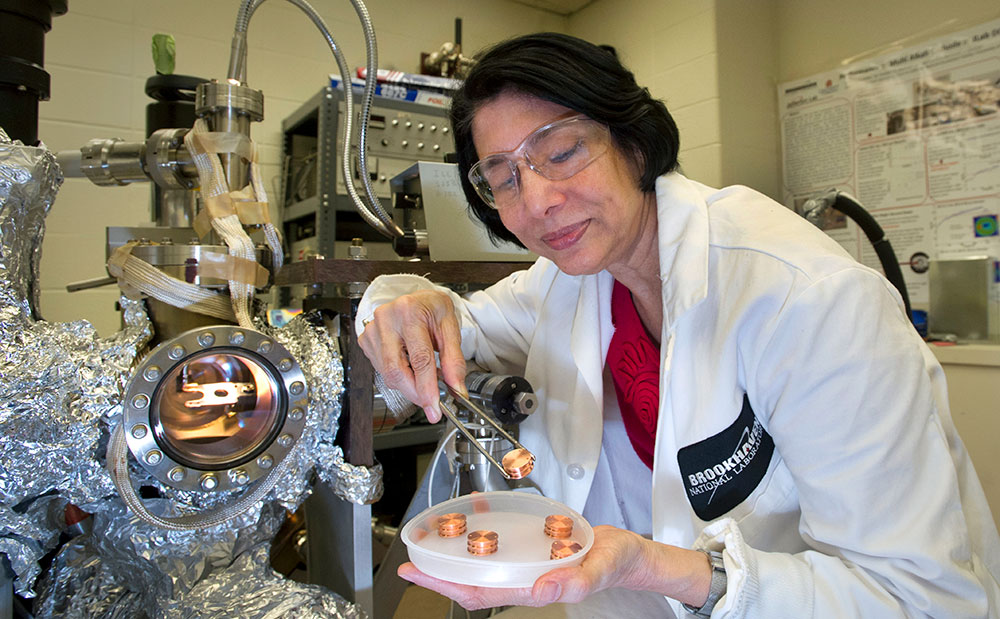Brookhaven's Triveni Rao Selected for Prestigious Fellowship by India's Ministry of Science and Technology
January 26, 2023
Triveni Rao, a senior physicist at the U.S. Department of Energy's Brookhaven National Laboratory, has been selected for the Visiting Advance Joint Research (VAJRA) Faculty Fellowship, a program that was developed exclusively for overseas scientists and academics to work as adjunct or visiting faculty, for up to three months, at a hosting Indian public-funded academic or research institution. The fellowship is sponsored by the Department of Science and Technology’s Science and Engineering Research Board (SERB) under the Government of India (GoI). The VAJRA program recognizes the value of international collaborative research as a crucial element of gathering different perspectives to solve complex problems.
“I am very pleased with this award,” said Rao. “This fellowship is very competitive, and it requires a substantial commitment from the Indian government, but in the end, both Brookhaven Lab and my host institute in Delhi, the Inter University Accelerator Center (IUAC), benefit from this.”
IUAC was established by the GoI’s University Grants Commission and is a premier user laboratory for university researchers working in multiple scientific fields, including accelerator science, ion beam production, nuclear physics, material science, and radiation biology. Along with the six different ion accelerators that are currently operational at IUAC, the center is in the process of building and commissioning a compact terahertz radiation (THz) production facility, under the leadership of Subhendu Ghosh, called the Delhi Light Source (DLS). The DLS, where Rao will be working, will house a Free Electron Laser (FEL), a light source that produces ultra-bright pulses of radiation by accelerating “bunches” of electrons through powerful magnets. These THz optical pulses are extremely fast, lasting for about a hundred femtoseconds, or one hundred quadrillionth (0.000 000 000 000 100) of one second.
“DLS will not only be using a single bunch of femtosecond electrons, but also a train of bunches, which has never been achieved as of yet,” explained Rao.
By observing the path of these THz photons when they interact with a molecule, scientists can piece together what that molecule looks like. With these pulses lasting for only a fraction of a second, researchers are able to capture quick reactions between molecules that are impossible to see otherwise. The imaging capabilities of this type of light source stand to benefit researchers in physical, chemical, biological, and medical sciences in India.
“Brookhaven Lab is a world leader in photocathodes, photoemission, Radiofrequency (RF) guns, and high brightness electron beams,” said Subhendu. “Combining this experience with capabilities at the DLS facility plays to the strengths of both institutions. Successful generation of high-power photons in this light source opens up a number of new research directions. The FEL team members and I are excited to host Triveni Rao. Her involvement will definitely be instrumental for a smoother commissioning and operation of DLS.”
Since joining Brookhaven Lab’s Instrumentation Division in 1985, Rao has been a driving force for several impactful projects. A cathode preparation process she developed three decades ago is still being used around the world. In collaboration with St. Petersburg Polytechnique Institute, she has developed a one-of-a-kind laser-triggered pulsed voltage source that can deliver, at the matched load, a record setting voltage of one megavolt in the duration of only one nanosecond, with extremely low timing jitter, or variation in the delay between the laser and the high voltage pulse. This system was instrumental in several applications, including testing the electrical breakdown properties of different materials.
Through a Small Business Innovation Research/Cooperative Research and Development Agreement (SBIR/CRADA) project with Advanced Energy Systems, Rao built and tested the first all niobium superconducting RF gun. This project paved the way for using SRF guns to produce high repetition rate electron beams. She also established a laser lab within the Instrumentation Division that houses several lasers with a wide range of wavelengths, pulse durations, and repetition rates.
Rao is a Fellow of American Physical Society, recipient of Brookhaven National Laboratory Science and Technology Award, Excellence in Science award from Brookhaven Town, and Distinguished Scientist award from Suffolk County. She is widely recognized for her work in lasers and photoemission, pioneering femtosecond photoelectron emission, and working extensively on the production and optimization of high brightness electron beams and the interaction between high intensity lasers and matter.
“I want to emphasize the fact that having an open, global scientific community really helps,” said Rao. “This would be the first terahertz FEL in India, and to say that Brookhaven had a significant role in this project speaks so well of our capabilities.”
Brookhaven National Laboratory is supported by the Office of Science of the U.S. Department of Energy. The Office of Science is the single largest supporter of basic research in the physical sciences in the United States and is working to address some of the most pressing challenges of our time. For more information, visit science.energy.gov.
Follow @BrookhavenLab on Twitter or find us on Facebook.
2023-20985 | INT/EXT | Newsroom










